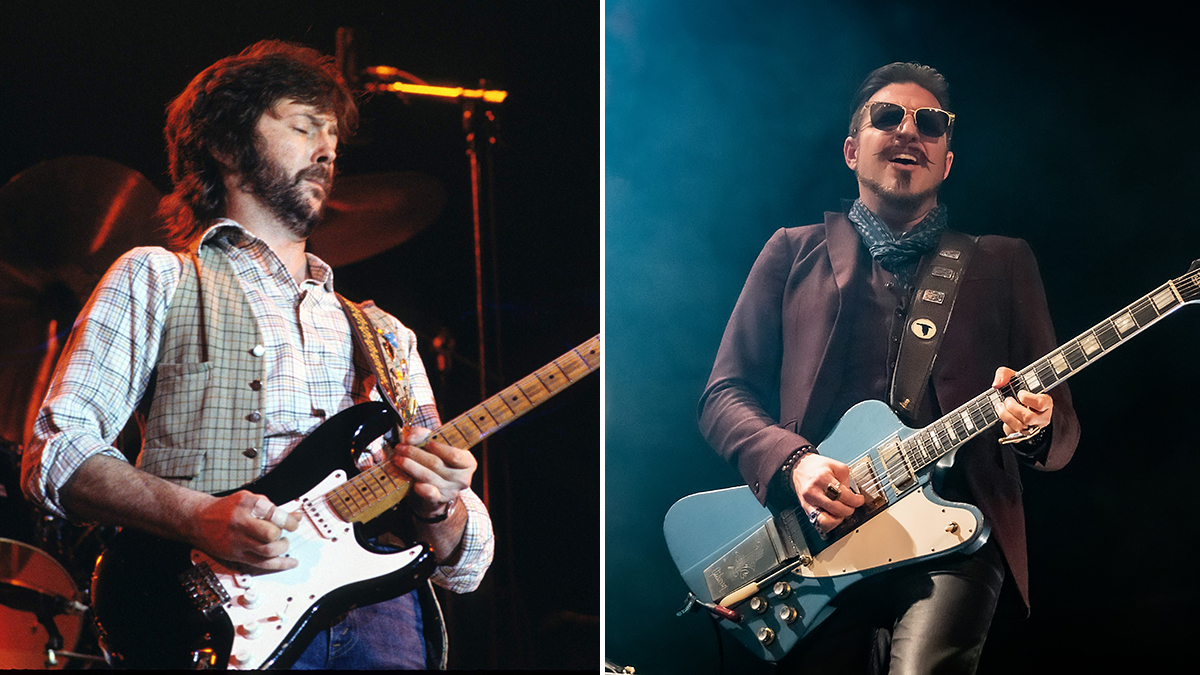
As a young guitarist on the way to carving out his own gutsy blues rock sound in Rival Sons, Scott Holiday was heavily influenced by Eric Clapton.
Like so many of his peers, Holiday cut his teeth learning rite-of-passage riffs such as Sunshine of Your Love by Cream and Steppin’ Out from Clapton’s brief but hugely significant tenure with John Mayall & the Bluesbreakers.
Speaking to Total Guitar during Rival Sons’ world tour in support of their new album Lightbringer, Holiday hails Clapton as one of the most influential guitarists of all time, and explains why the Brit bluesman is an “ever-present force” in his own playing.
Young Eric: Breaking the blues in Britain and becoming ‘God’
“There were English guys playing blues in the ’60s, but I think we can all fairly agreeably come to the same conclusion that Clapton is the quintessential white guy playing the blues, who brought so much attention to it. Clapton was predominantly a fan of Muddy [Waters], B.B. King and Howlin’ Wolf, or Robert Johnson, Buddy Guy and Hubert Sumlin. These were his guys and I think it’s fair to say that not as many people would have come to them without him.
“For me, he’s responsible for a large part of that, kind of like The Rolling Stones. But, even before the Stones, Clapton was an authentic player. He was better at it than all those guys early on – and he was louder. I think this is where ‘Clapton is God’ begins. He creates a big wave. It’s not just going to be these hipsters playing blues; it becomes cool.
“He probably wanted to be more of a hipster and that, in the end, is why he ended up wanting to leave The Yardbirds. They wanted to be a pop act. Eric’s a blues guy, and so he goes with John Mayall. That ended up being a great choice and a breeding ground for so many great guitar players.
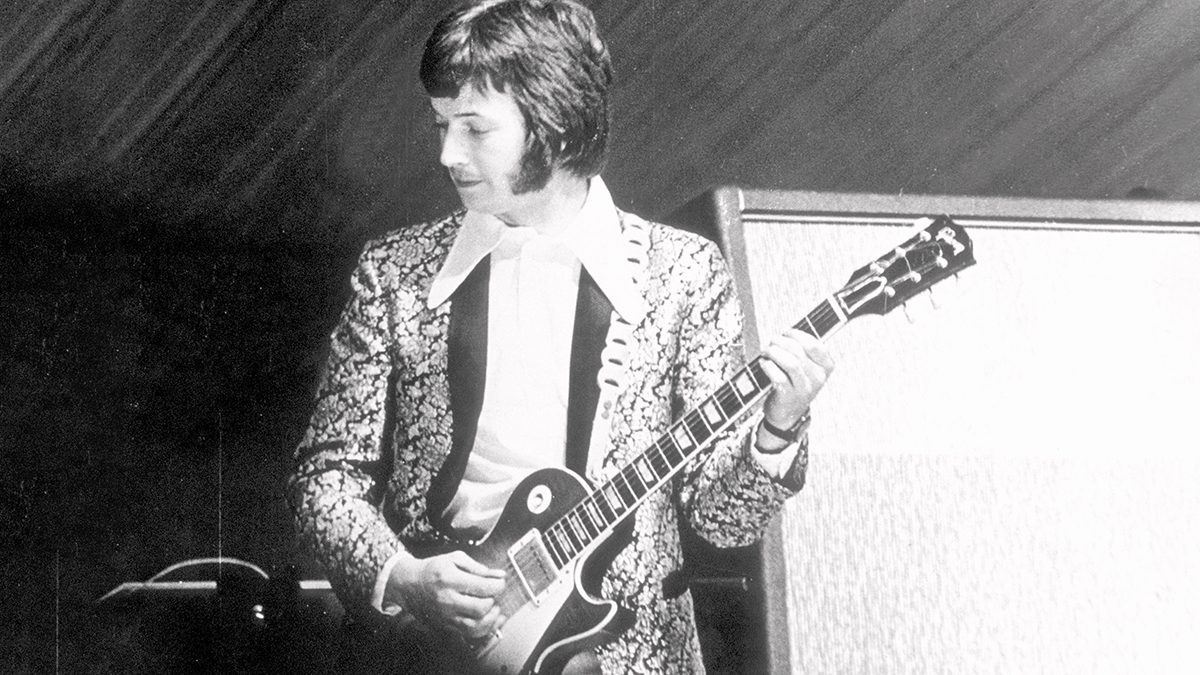
“Clapton on the The Beano Album (aka Blues Breakers) – with the Les Paul, Bluesbreaker amp and Treble Booster – is the quintessential tone. I have used a Rangemaster Treble Booster in my setup and the singular reason I put that pedal in there when I was just starting in this band was because of that Bluesbreaker tone.
“Also, from a very young age, Clapton played with a stately kind of authority. It’s missing in guitar today. It seems like every great guitar player has to play very, very fast. And even if they play a slow line, they then have to play very, very fast around that line and show every bell and whistle under the sun. It can be distasteful, honestly. A lot of guitar players don’t share that sentiment, but that’s my feeling. Clapton epitomises this idea to me.”
The psychedelic ’60s: Fresh Cream, hot fuzz and the ‘woman tone’
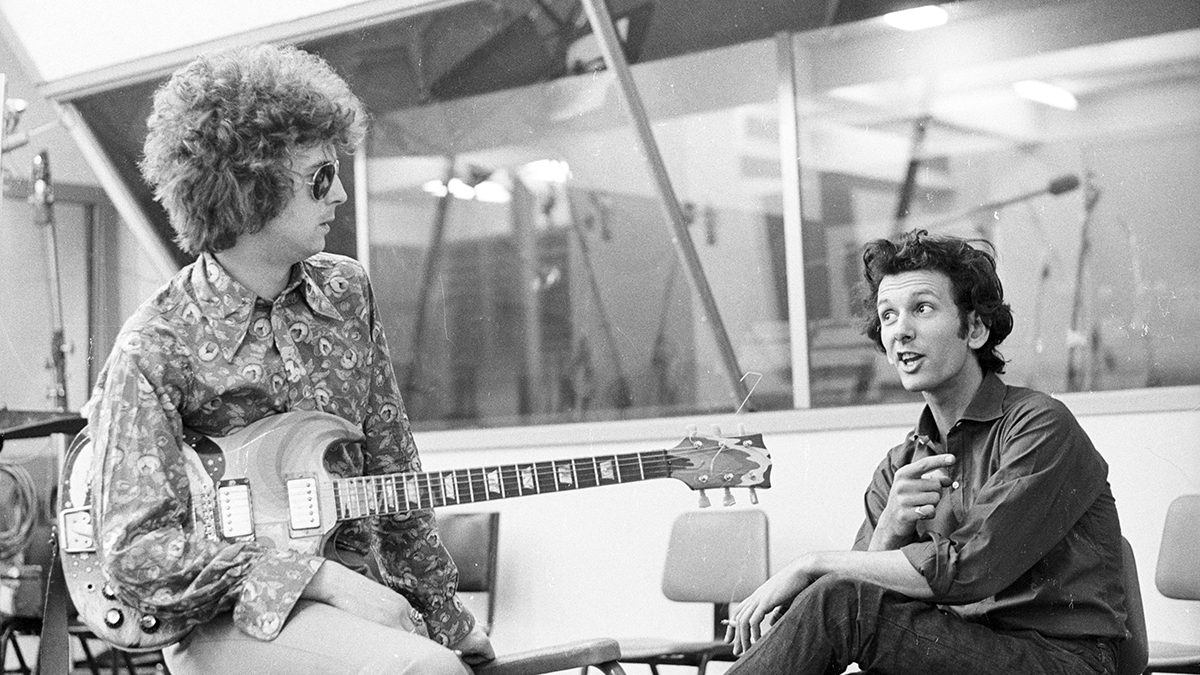
“As far as Cream, I think the sonic soundscape Clapton was coming up with for Wheels of Fire and White Room is important. The fuzz sounds and how he was layering things with reverb and fuzz and the tonal spectrum he was into resonates with me.
“A lot of people don’t hear a lot of Clapton in me, but he’s still an ever-present force. If you think about the earliest guys using fuzz that were iconic guitar players, most people will say Jimi Hendrix first. Then, probably they’ll say Eric Clapton second, even though Jimi Hendrix would have said Eric Clapton first!
“For a short period, Eric played a Firebird I – a one-pickup Firebird – and, when I decided to play Firebirds in this band, I knew I needed a guitar that covered more than the Strats or Les Pauls or SGs that I’d used before. It needed to be something different. I was a Strat guy at the time and I actually referenced Clapton playing that Firebird I and said, ‘That feels like me.’
“More than just the tone, I think the ‘woman tone’ reference comes from his hand. It’s how he sings. He makes the guitar cry a certain way. It’s because he’s got that authoritative slow hand. I’ve seen him describe it as basically just winding the tone control all the way down, so you kind of lose that shrill top and the notes move together a little bit cleaner.
“I don’t do that. I play with the guitar wide open, but when I understand how he was doing it, I feel like the gear he was using – with those Marshalls cranked up – really leads you into that world. With other amps and guitars, it just gets a little dirty. It really worked because those Marshall amps were so toppy. I do things with the wah in the heel position to achieve that, and also fuzz pedals and different stuff that’s warm and allows the guitar to sing similarly.”
‘Mature Clapton’: Blind Faith and a ‘transcendent’ approach to guitar
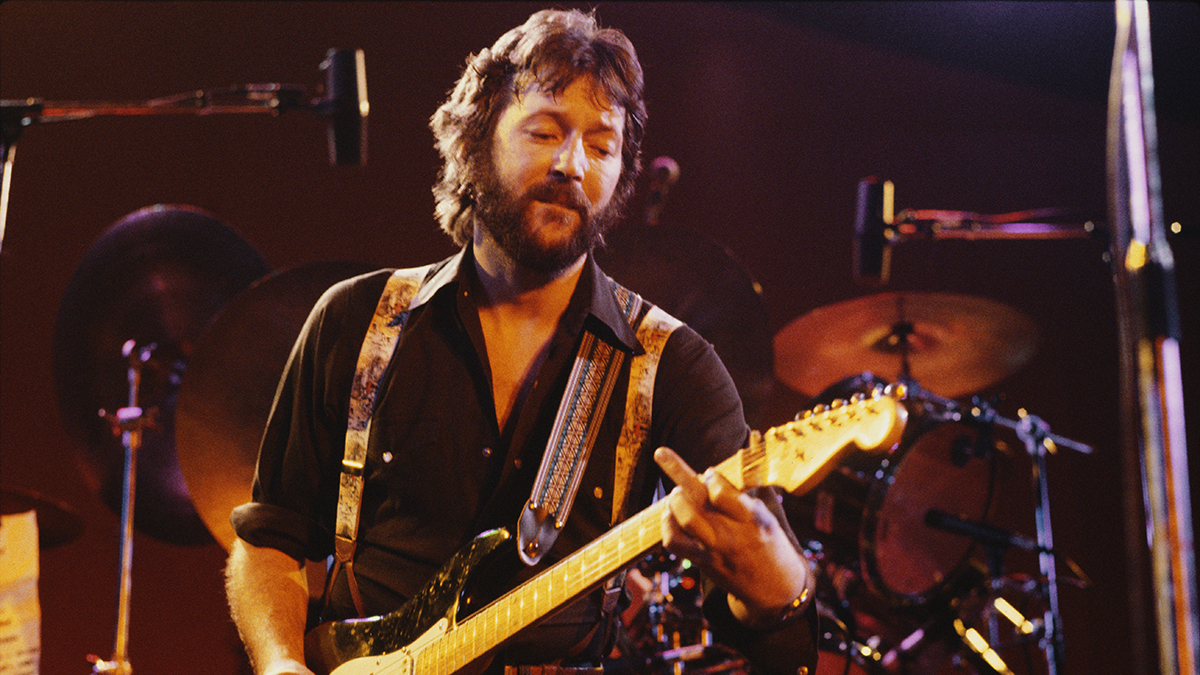
“I love the [1969 self-titled] Blind Faith record because Eric emerges as a vocalist and he’s a great for what he’s trying to accomplish. He’s super-emotive, super-effective and I love seeing him stand shoulder to shoulder with Steve Winwood. His guitar with Steve, too, is such a cool thing. It’s less about fuzz and the trio ‘blues explosion’; it becomes an almost spiritual thing and it’s more transcendent with this group. It’s about songwriting and texture.
“I also love the imaging that Eric has always done; from that Beano look with very short hair, to starting to become more bearded and hairy in Cream. It’s cool. I’ve always thought that guitar players specifically should look like their records and evolve with their records.
“I feel like Clapton did a really good job of being in the moment with his image and not being afraid to change and evolve at such an ever-evolving time. So, by Blind Faith – in just a matter of years – he’s evolved all the way as if 10 years have gone by, but it’s only just a few. We get this more mature Clapton. His hand is more mature and I love that era.”
The Layla Years: Pain, Duane and sharing the spotlight
“Clapton seems like such an older musician by the time he gets to [1970’s] Layla and Other Assorted Love Songs. His look, his hand, his voice and how he’s writing are not like he’s ageing a few years between records – it feels like 10 years have gone by and he’s amassed this immense amount of deep emotion and pain.
“I think pairing him with Duane Allman is a magical thing to hear and that inspired so many people. That songwriting and this kind of guitar duo was a very new sound. I feel like Eric’s always wanting to play and be a part of something great. He never really seems to let his ego get in the way.
“Even when he joined Cream, he had to have [bassist] Jack Bruce, because Jack’s an astounding player. We see a lot of this through his career; like having the confidence to play as an unknown player on a Beatles record. I mean, come on! This is a huge accolade!
“I always knew as a kid that it was Clapton playing this unbelievable solo on While My Guitar Gently Weeps. The fact he was willing to do it kind of secretly is very indicative of how I see him. This Derek and the Dominos record certainly is the same idea. He really was willing to go, ‘We’re all just making good music.’ When I get around the best players that I can play with, that’s how we all feel. He epitomises that.”
Solo Eric: Keeping the blues alive in the 1980s and beyond
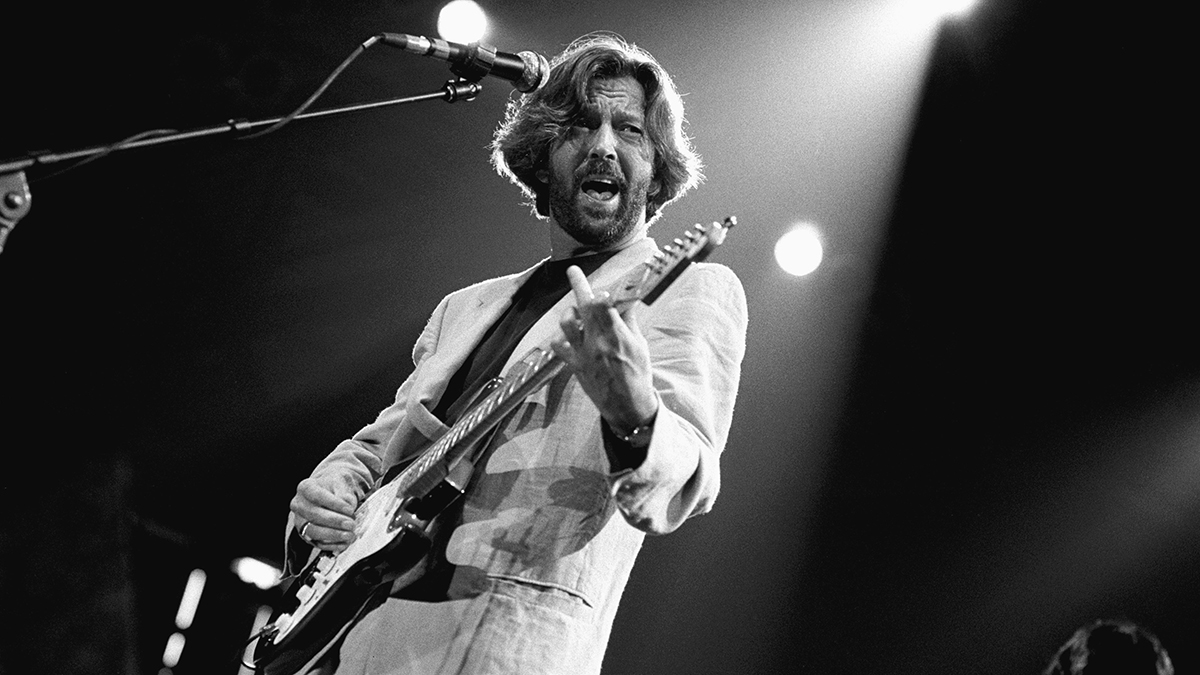
“I think there’s so much to appreciate about Eric in the ’80s. I’ve done music my whole life and, in this band alone, I’ve done 15 years. So, there’s something great about watching musicians evolve comfortably and with authority.
“He could really just have phased himself out and been this guy who played blues that was hip in the ’60s. It was not hip in the ’80s. It kind of fell flat for a while, but he was there. He was there and he was able to create a modern sound and still put the blues in there. I think he was still paving a way for guys like Stevie Ray Vaughan or Robert Cray.
“There was a blues scene in the ’80s that seemed to perk back up and I think a lot of that had to do with Clapton. But, he wouldn’t have been able to do it if he was making John Mayall records. He was making modern-sounding records and his tone was completely different.
“It was this very ’80s, flat, simple chorus tone and it just worked. I really dig that he was able to move with the times and I use that as a great example to witness for myself.”
Tone, phrasing and making the right choices
“I love Clapton’s tone, and I think his phrasing is fantastic. Of course, I can hear who he’s referencing with his phrasing – he’s not shy about it and we hear a lot of his heroes in his phrasing. But something I really appreciate – and he had it from a young age – was authority in the choices he makes.
“You can’t really fake that, but we can learn from listening to what that sounds like. You don’t need to play a lot to say something and sometimes when you play less, it allows your voice to come through better. When I listen to young Clapton, or if we move into Cream, it’s all about big lines. They’re big, wide lines that are very distinctive and authoritative.
“Even on Sunshine of Your Love, when he’s playing that riff, it’s just big, fat lines and I really love that. When I’m producing other guitar players, I’ll reference him and remind guitar players of Clapton because they all want to go fast. If they’re playing blues, they’re referencing Stevie Ray Vaughan and it’s got to be one-and-a-half bends and as fast as you can go.
“With Clapton, it’s never just a flurry of notes. It’s never a mess. It’s never just some blurry pattern he’s busting through. It’s really distinctive. He still does it today. He did it when he was a kid. It’s in him and what that tells me is: it's in his heart, in his hand and in his mind. It’s all connected and he’s able to translate that onto the instrument with a lot of confidence and assuredness. I try to aspire to that same thing.”
- Rival Sons’ Lightbringer is out now.







